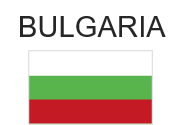
National Interoperability Framework
The National Interoperability Framework (NIF) is a set of standards, policies, and guidelines that ensure that information and communication technology (ICT) systems can communicate and share data seamlessly. It promotes the development of interoperable systems that facilitate data exchange and collaboration between different organizations and levels of government. The NIF provides a common language and a framework for ensuring that ICT solutions are compatible, secure, and reliable, which enhances the efficiency of public services and improves citizen outcomes.
National Interoperability Framework (BNIF) for Information Systems of Executive Authorities Year: 2014 - 2022 | The National Interoperability Framework (BNIF) for Information Systems of Executive Authorities is a draft document for a medium-term strategy whose goal is to implement the eGovernance Development Strategy 2014-2020. The aim of the interoperability framework is to facilitate public sector operations and to increase public sector efficiency in Bulgaria by improving the quality of services provided to Bulgarian and EU citizens. It has not been legally adopted by any decision yet. The National Interoperability Framework (BNIF) is currently being updated in line with the European Interoperability Framework. |
Good Practices
This section provides examples at the national level in line with a selection of different thematic areas of the European Interoperability Framework (EIF). Further initiatives and good practices are available in the country’s Digital Public Administration Factsheet.
In Bulgaria, all computer programmes being developed to implement IT solutions must meet the criteria for open source software. This is a mandatory requirement when drawing up the specifications, which is set out in Article 58a of the eGovernment Act: "In preparing technical specifications for the conduct of public procurement for development, upgrade or implementation of information systems or electronic services, administrative bodies shall necessarily include in the specifications the following requirements: 1. in cases where the subject of the contract involves the development or upgrade of computer programs: (a) computer programs must meet the criteria for open-source software. A portal for publishing meta-data of software solutions, source code repository and version management system for the administration's projects has been established".
The Ministry of e-Governance (MEG) has developed and implemented an unified model for centralised requests, payments and deliveries of electronic administrative services and related information. The access and use of electronic administrative services by citizens and businesses is ensured through the application of widely available and popular technological solutions. The provision of the electronic administrative services is also provided through the Unified Portal for Access to Electronic Administrative Services (UPAEAS), a software designed on the basis of Service-oriented Architecture (SOA). In this way, applying the basic principles of service-oriented architecture, an independence and avoidance of the imposition of certain technologies, products and suppliers are achieved.
An eGovernment Architecture Council has been set up, which has the function to review and adopt interaction models, interfaces, and standards with regard to interoperability. An Interinstitutional Spatial Data Council also is in operation. It is responsible to assist the relevant state authority in the creation of the methodological guidance on the construction, implementation, development, and use of the spatial information infrastructure, in particular in relation to establishing rules for the exchange of spatial data sets and services for such data, access agreements, coordination, and monitoring mechanisms.

.png?itok=0IRAD1eb)